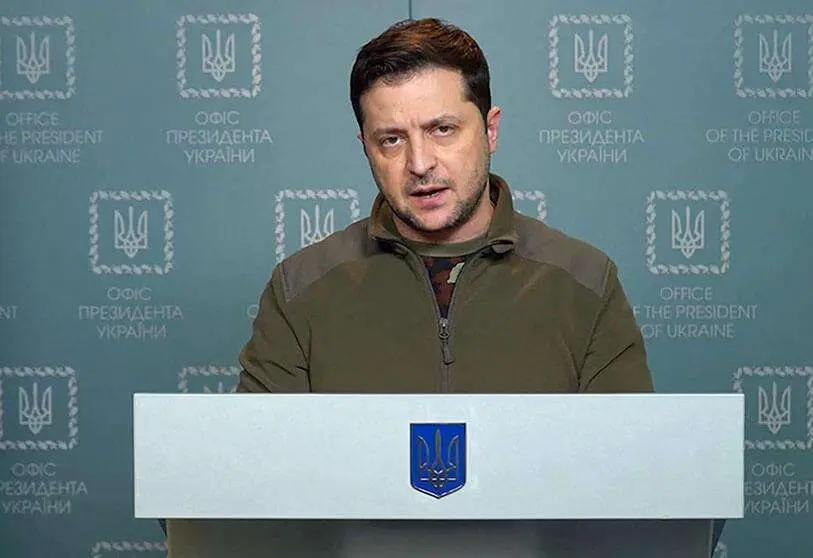Once again, Eurocentrism

Little more can be added to what is happening in Ukraine right now apart from all the analyses and opinion articles that have been published in all the media over the last few days. Indeed, much of the material produced on this issue has focused on highlighting the impossibility, improbability, or at least the irrationality of an armed Russian invasion of Ukrainian territory.
It has been said that Russia's intentions were focused on the Donbas, on creating a corridor between Crimea and this region, that it was only seeking to put pressure on the West, that the number of Russian soldiers on the border was not sufficient for a full invasion of the country, that the economic sanctions of the EU and the United States in the event of an invasion would be unbearable... In short, from the West this conflict has been approached in terms of the so-called "capitalist peace", a logic based on conceiving war as the worst scenario for the market economy, as it prevents its normal development. In fact, apart from the recent EU arms shipment to the Ukrainian government, all negotiations and threats from the West have focused only on the economic issue.
The military escalation has been analysed in terms of economic viability and we find that the threat of destroying the Russian economy has not been enough to stop the invasion. However, I do not intend to carry out an ex-post analysis with the benefit and certainty that only the passage of time can offer. It is not now a matter of looking back and reviewing all those signs, which are now evident to us as the conflict unfolds. If we have heard in many media that Putin has played with the West, we will have to see why the West has not been able to play with Russia, because despite the paroxysm surrounding Vladimir Putin, for better or worse, Russia is not just about its leader.
As it is, we are faced with two facts that cause astonishment in the mainstream Western media when it comes to the Russian army's invasion of Ukraine. Ukrainian President Volodymir Zelensky has begun to be portrayed as a hero for the way he has dealt with the invasion; he has resisted, he has not left Kiev, and he has delivered a strong speech both to the EU and to the invader. But why all this attention when it was hardly given any credit during the negotiations? Prior to the invasion, the Ukrainian president received no media attention whatsoever, his presence in the negotiating process was discreet to say the least, almost invisible. Now that neither Biden nor Blinken is speaking, now that the complexity of the conflict has escalated, it is his turn to speak.
This positive assessment of Zelensky as a representative of democratic values in Ukraine, as a courageous and tenacious leader, goes hand in hand with gestures of admiration for the resistance of the Ukrainian people and the Ukrainian army. Every day that passes, every metre that is not advanced, every video showing a Russian casualty, signifies a resounding failure, not of the Russian army, but of Vladimir Putin himself. It is rather curious how, with an arrogant and proud tone, many seem to congratulate themselves on the fact that the Russian army has not been able to overrun Kiev, when the truth is that it has not yet deployed its full military potential.
What strikes me is not the fact that the Ukrainian army, completely inferior to the Russian one, is resisting, a resistance that will have to be evaluated in the long term, but the fact that this resistance is causing so much astonishment in the West. This astonishment comes, in my view, from the scourge of Eurocentrism that we are incapable of overcoming. Only we are capable of the best - peace and resistance - and, contradictorily enough, the worst, for few thought Putin capable of invading Ukraine. Only we allowed ourselves such licences in the name of our values, just as we did in Iraq.
All the surprise about the invasion and the resistance comes from the fact that, on the one hand, Zelenski and his army were never given any credibility at any time, since, in my opinion, it is premature to speak of resistance as we understand it, for example, Sarajevo-style. On the other hand, Putin was never believed to be capable of invading, of sacrificing his entire economy for a neo-colonial tsarist invasion. Worst of all, he has done it and as we see, despite all the unprecedented sanctions adopted, we see that there is a military convoy of tens of kilometres in the direction of Kiev and, unfortunately, not much prospect of successful conversions on the border with Belarus.
All this gives much to think about in terms of the way we look at the world, for it seems that our reality is distorted in relation to what is happening in the world. To all this, in the face of the invasion, a synchronous promise of accession to the European Union, to the suffering of the population, deaf ears. We will have to see who, after this conflict, will be in charge of rebuilding Ukraine and if this will help us to face this new world order that is being created.
rafaelarjonasoria@gmail.com

